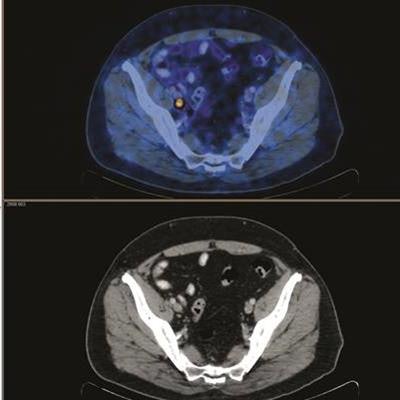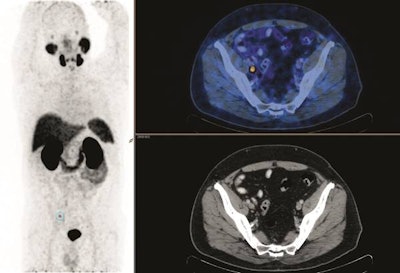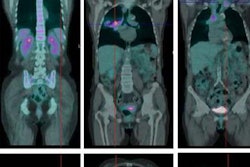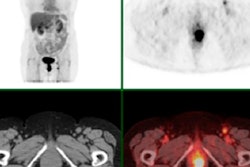
Prostate-specific membrane antigen (PSMA) PET/CT scans can help identify prostate cancer patients with rising levels of prostate-specific antigen (PSA) after radical prostatectomy who can most benefit from salvage radiation treatment, according to a study published in the December issue of the Journal of Nuclear Medicine.
Australian researchers took a somewhat novel approach by investigating whether the use of PSMA PET/CT affected patient response to treatment, not just whether PET scans resulted in a change in management.
"In the study, these patients underwent imaging with a PSMA-PET scan and had treatment based on the results of the scan findings," said co-author Dr. Louise Emmett from St. Vincent's Hospital in Sydney. "The study then followed how these men were treated, and whether the treatment was effective."
The researchers analyzed 146 men; 99 patients received salvage radiation treatment, with an overall treatment response after salvage radiation of 72%. Among the negative-PSMA patients, 44% (27 of 60) had salvage radiation treatment (JNM, December 2017, Vol. 58:12, pp. 1972-1976).
The negative-PSMA patients who received salvage radiation treatment had an 85% treatment response; meanwhile, 65% of the negative-PSMA patients who did not receive salvage radiation treatment experienced increases in prostate-specific antigen.
 A 69-year-old man presented with rising PSA (0.16 ng/mL) following radical prostatectomy for prostate cancer classified as Gleason score 7 four years prior. PSMA PET/CT showed a solitary pelvic node with no prostate fossa recurrence. The patient underwent salvage radiotherapy including both fossa and pelvic node fields. PSA continued to rise, and repeat PSMA imaging showed new sites of PSMA-avid nodal disease in the common iliac region, directly above the radiotherapy field. Images courtesy of Emmett et al and JNM.
A 69-year-old man presented with rising PSA (0.16 ng/mL) following radical prostatectomy for prostate cancer classified as Gleason score 7 four years prior. PSMA PET/CT showed a solitary pelvic node with no prostate fossa recurrence. The patient underwent salvage radiotherapy including both fossa and pelvic node fields. PSA continued to rise, and repeat PSMA imaging showed new sites of PSMA-avid nodal disease in the common iliac region, directly above the radiotherapy field. Images courtesy of Emmett et al and JNM.For individuals with disease confined to the prostate fossa, 83% responded to salvage radiation treatment. For men with nodal disease, 61% had a treatment response following salvage radiation treatment.
"The results of the study show that PSMA PET is more predictive of a treatment response than PSA level, surgical margins, or seminal vesicle involvement," Emmett said. "In addition, men with a negative PSMA-PET scan were the most likely to respond to salvage radiotherapy with a significant treatment response."




















